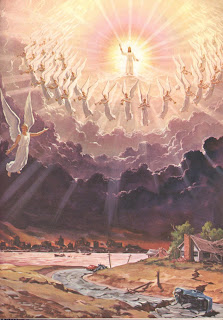The Unknown Day and Hour
[Jesus said to his disciples,] 37“For as it was in the days of Noah, so it will be at the coming of the Son of Man. 38In [those] days before the flood, they were eating and drinking, marrying and giving in marriage, up to the day that Noah entered the ark. 39They did not know until the flood came and carried them all away. So will it be [also] at the coming of the Son of Man. 40Two men will be out in the field; one will be taken, and one will be left. 41Two women will be grinding at the mill; one will be taken, and one will be left. 42Therefore, stay awake! For you do not know on which day your Lord will come. 43Be sure of this: if the master of the house had known the hour of night when the thief was coming, he would have stayed awake and not let his house be broken into. 44So too, you also must be prepared, for at an hour you do not expect, the Son of Man will come.”
Alert and Watchful!
At the height of nature’s fury that was the typhoon called Milenyo, my friends and I watched helplessly as roaring winds tossed aside branches of trees, galvanized iron, billboards, and even pieces of heavy metal as if these were weightless objects. Someone shared that, although he was not a stranger to calamities and disasters, Milenyo shook him up. I remember his words as I reflect on today’s Gospel.
Bible exegetes tell us that the gospel scenarios are not predictions about the “end of the world.” Neither are they intended to instill fear—not even “holy fear”—in people’s hearts, as doomsayers contend. Rather, these are “elements” of an apocalyptic discourse common in the time of Jesus and of the early Christians. Apocalyptic imagery was frequently employed in describing the entrance of God onto the stage of history to “put things right,” especially for his persecuted people. Apocalyptics is really a “resistance literature,” intended to strengthen those who suffer because of their faith. It encourages them to hold on because the Lord is on their side and will rescue them.
As we open a new liturgical year, we are reminded that with Advent, we not only recall the past coming of Jesus in the flesh (Christmas) but also look forward to his coming in glory (Parousia). Because we no longer feel the tension of Jesus’ coming as the early Christians did, we usually pay only lip service to a fundamental element of our faith: Christ will come again to judge the living and the dead.
But even if no one can tell when the Parousia will take place (and we should not listen to those who claim they do), to have expectations or to feel tension in our lives is necessary for our spiritual growth. Jesus exhorts us today: Stay awake! Be prepared!
“In those days before the flood, they were eating and drinking” (v 38). This is the stupor of the rich and the comfortable who wallow in pleasure. They are challenged to see beyond what the eyes can. The anxieties of daily living can afflict both the poor and the rich. We are not told to forget life’s problems, but definitely there is more to life than worrying: What are we to eat, what are we to drink, what are we to wear? (see Mt 6:25). If we focus only on these things, we can easily get discouraged.
Standing before a group of persons who were feeling utterly discouraged, a motivational speaker took a large piece of white paper and made a black dot in its center with a marking pen. He held up the paper and asked, “What do you see?”
One person replied, “A black dot.”
“Do you see anything besides the dot?” the speaker asked.
The audience said in unison, “No!”
“But you have overlooked the most important thing,” he pointed out. “You disregarded the sheet of paper!”
He proceeded to share that people allow themselves to get distracted by small, dot-like failures. These monopolize their attention, drain their energy, and keep them from seeing the paper—the blessings, successes, and joys that outweigh the disappointments.
This little anecdote from God’s Little Devotional Book for Leaders reminds us of the call of Advent. We should not lose sight of the bigger picture of our faith, including spiritual realities. We should not allow the smaller view of our present concerns to blind us or make us live like “drunken” people.









